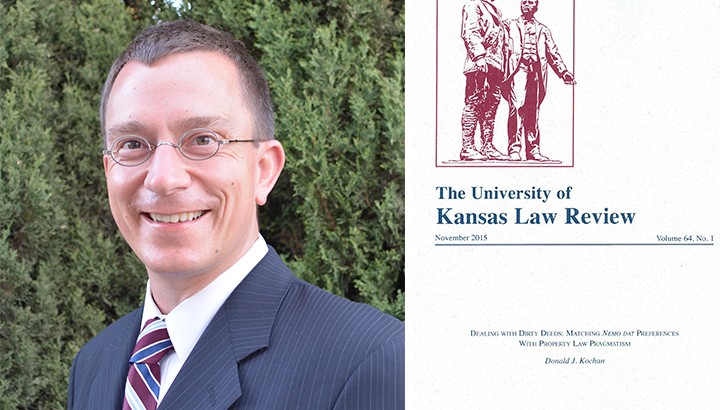
Chapman University Fowler School of Law Associate Dean Donald Kochan Publishes “Dealing with Dirty Deeds: Matching Nemo Dat Preferences with Property Law Pragmatism”
January 14, 2016
Chapman University Dale E. Fowler School of Law Associate Dean Donald Kochan’s article “
Dealing with Dirty Deeds: Matching Nemo Dat Preferences with Property Law Pragmatism
” was recently published in Volume 64 of the
Kansas Law Review
.
From the abstract:
When title disputes arise between two or more purchasers, we have accepted pragmatically that exceptions must be made to applying the Latin maxim nemo dat quod non habet – roughly translated to mean that one can only transfer what they own – even though using such exceptions means that we will, in essence, at times validate fraud and other dirty deeds. This Article outlines the basic place of the nemo dat principle in our system of law, introduces the tensions between the ideal adherence to the maxim and the realities in the world that necessitate exceptions to (or a sometimes less-than-ideal achievement of) the maxim, summarizes the recording acts and their purposes (along with the types of notice and their uses), and exposes the tensions these recording systems each have with a strict notion of nemo dat. It explains why the protections for bona fide purchasers are necessary to facilitate markets in property and serve other goals, while examining the role of individual responsibility – particularly as it relates to purchaser obligations to record and examine records – as the core justification for setting the rules in a manner that first-in-time title holders sometimes lose out to subsequent purchasers.
Pragmatism concerns make some nemo dat exceptions necessary, but we should find ways to minimize the need for invoking such exceptions principally by shrinking the pool of those who fit the criteria for the bona fide purchaser exception. This Article proposes that we should search for ways to so shrink that pool not by changing the nature of the protections available to innocent bona fide purchasers but instead by finding new ways to inject more information about land conveyances into the public view – beyond traditional recording mechanisms – so that more and earlier notice of possible competing property claims is available to responsible purchasers exercising due diligence.
To accomplish that goal, this Article presents a proposal to take advantage of what can be characterized as “the underexploited utility of inquiry notice.” The idea is to create better conditions to give first-in-time purchasers additional opportunities to protect their title interests by more easily triggering the inquiry obligations of second-in-time and other subsequent purchasers. The Article outlines the components of a proposed new and innovative service called the “Title-Related Inquiry Notice Triggering System” (TINTS). As outlined, TINTS would operate in a manner that would provide a means for purchasers of property to protect their claim to title even earlier than official recording might accommodate. TINTS, or other innovations like it, can assist us in matching nemo dat preferences with property law pragmatism.
Donald J. Kochan
is the Associate Dean for Research & Faculty Development and Professor of Law at Chapman University Dale E. Fowler School of Law. Dean Kochan has published more than 35 scholarly articles and essays in well-respected law journals. His work has been cited in more than 300 published law review articles, and his articles have been downloaded more than 11,000 times from SSRN and BePress. Among his numerous activities, Dean Kochan currently is a Contributing Editor of the “Keeping Current-Property” section in
Probate & Property
, the bi-monthly magazine of the Real Property, Trust & Estate Law Section of the American Bar Association, serves as the Chair-Elect for the Section on Property Law for the Association of American Law Schools, serves as a Co-Editor of the Jotwell section on Property Law, and serves as Vice Chair of the Committee on Environmental & Natural Resources Regulation of the ABA Section on Administrative Law & Regulatory Practice. Dean Kochan teaches Property I & II and Administrative Law, among other courses. Related recent works include “
Keepings
,” published in December 2015 in the
New York University Environmental Law Journal
, and “
A Framework for Understanding Property Regulation and Land Use Control from a Dynamic Perspective
,” published in 2015 in the
Michigan Journal of Environmental & Administrative Law
.
